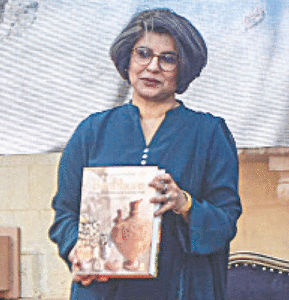KARACHI: It was in 2012 that a young National Academy of Performing Arts (Napa) graduate Sunil Shankar impressed theatre lovers with his intrepid undertaking of Peter Shaffer’s complex play Equus at a festival held at the academy. It made an impression on the audience on multiple levels — the understanding of the psychosocial undercurrents of the script, and conjuring a corresponding environment where the entire expanse of the stage turned into an eerie habitat created by the writer were a couple of noteworthy aspects.
Five years on, on Thursday to be precise, Shankar goes back to the same text, translated into Urdu by Nazrul Hasan and Shankar, and puts up Equus on the Napa stage with a different cast — save for Nazrul Hasan. Did he impress this time around? Let’s delay the answer for a bit.
The subject of Equus is brought to light early on in the play when psychiatrist Martin Dysart (Nazrul Hasan) is visited by his friend Hesther (Mehr Jafri). She tells him about a 17-year-old boy Alan Strang (Ali Junejo) who has blinded half a dozen horses. Hesther wants Dysart to treat the boy. The psychiatrist doesn’t know what he is getting into. He thinks of it as a regular case. It is the boy’s refusal to give him a straight answer that makes him dig deeper into the situation.
Examinations reveal that Alan’s parents Dora (Shama Askari) and Frank (Saad Zameer) have been raising him in an unusual way — the mother is a devout Christian who keeps filling her son’s ears with stories that have horses in them; and the father is not religious at all. Alan has taken an indescribable shine to horses. Then there is the character of Jill (Natasha Ejaz), the girl he meets in a stable, who falls for him — adding another convoluted angle to the tale, because the boy can’t seem to get his mind off the horses, especially Nugget (Kashif Husain, wearing an equine mask).
Now the question that needs to be asked: what made Shankar do the play again when it was the same project that established him as a formidable theatre practitioner, and one expected him to push the envelope a bit more? The obvious answer would be: he finds the script irresistible. Fair enough. If that is the case (and I’m assuming that it is) then chances are that he wants to further explore or unearth the different psychological strands in the text. That doesn’t seem to happen in the current production. So let’s go back to the production that pleasantly surprised everyone a few years back.
Alan Strang, with all his psychological shortcomings, acted his age. The hoof-stomping (feet-stomping, if you like) on stage didn’t sound lazy at any moment. The performances were tight. Lights were switched on and off on-cue, almost. And the atmosphere created on stage gelled with the high-strung tensions in the story.
There is no doubt that Shankar is very good with movement(s) — the performance on Thursday endorsed it one more time — but when it comes to extracting the best out of his actors, he still needs a bit of work to do. Back to the drawing board!
Published in Dawn, October 21st, 2017













































Dear visitor, the comments section is undergoing an overhaul and will return soon.